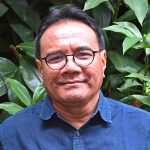Knowledge exchange plays a vital role in establishing strong links between researchers and research users such as policymakers, governments, non-governmental organisations, media, and local communities to share ideas, experiences, and best practices.
CIFOR-ICRAF’s research on wetlands has had important impacts on policy and science in recent years. As part of our ongoing outreach and engagement efforts, we regularly provide insights and perspectives to the study of wetlands, including mangroves, peatlands, and seagrass meadows, in two-way exchanges with partners and stakeholders.
We therefore cordially invite you to participate in the Wetlands Knowledge Exchange, a digital event hosted by CIFOR-ICRAF to provide updates, perspectives, and recent scientific developments on wetlands research with leading CIFOR-ICRAF scientists. Our aim is to help promote the value of these critical ecosystems in efforts to achieve the Sustainable Development Goals (SDGs).
Alongside initiatives like the UN Decade of Ecosystem Restoration, CIFOR-ICRAF will present a range of innovative research and solutions to help ensure sustainable management and protection of these vital resources.
Why Wetlands?
Tropical wetlands are complex, fragile ecosystems. They store more carbon than tropical forests and provide a range services from protecting biodiversity to providing fresh water. CIFOR-ICRAF is a leader in putting these little-known ecosystems on the global policy map.
From Asia to Latin American and Africa, CIFOR-ICRAF is investigating how wetlands can help with climate mitigation and adaptation and better contribute to the many ecosystem services including ecotourism, providing habitats for rare and endangered species, functioning as a source of nutrients and energy and providing livelihoods for local communities.
Key Highlights
- Coastal blue carbon research has gained extensive knowledge on factors that influence and contribute to decision-making in climate talks
- Collaborative fire management research demonstrated combination of engagement of knowledge build a consensus on the best ways to reduce the risk of fires
- Bioenergy research examine economic incentive for private sector and community groups to undertake restoration efforts whilst analyse benefits and disadvantages of bioenergy policies and practices
- Integrated forest and farming participatory research facilitated community-based fire prevention to mainstreams land development without using fire
Presentations
- Tropical wetlands matter
- Restoring blue carbon
- Fire management in wetlands restoration
- Recreating energy smart ecosystems in degraded peat swamp forests
- Community management of peatland: Participatory action research for community-based peatland restoration
Agenda
Web resources
Publications
- Purnomo and Puspitaloka, 2020. Pembelajaran dari Pencegahan Kebakaran dan Restorasi Gambut Berbasis Masyarakat.
- Jalil et al. 2021. The role of social capital of Riau women farmer groups in building collective action for tropical peatland restoration. Forest and Society 5(2): 341-351
- Purnomo et al. 2021. A political-economy model to reduce fire and improve livelihoods in Indonesia’s lowlands. Forest Policy and Economics 130:1-26.
News and more
- Energy from forests feature
- The power of peatlands
- Traditional tamanu healing land and body
- Wetlands restoration video
- They are critical for fighting climate change but . . . do you really know the importance of tropical wetlands?





















